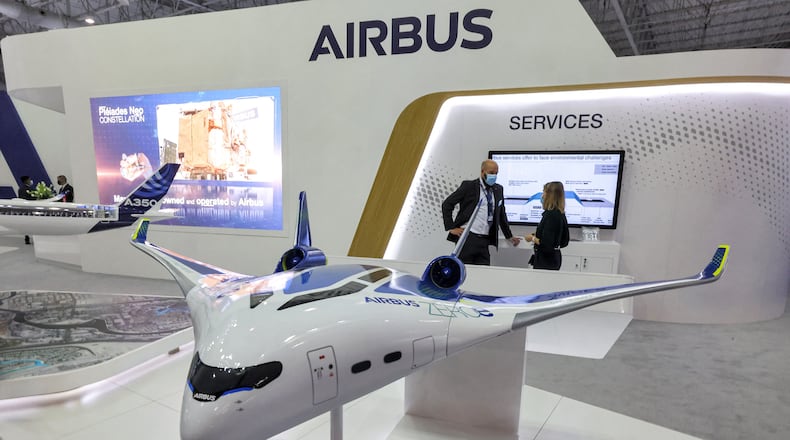Hartsfield-Jackson International Airport is joining with Delta Air Lines, aircraft manufacturer Airbus and hydrogen fuel cell developer Plug Power to study the possibility of hydrogen fueling for air travel at the world’s busiest airport.
Delta and Airbus had already partnered to study the potential for hydrogen fuel. Now, Hartsfield-Jackson has joined in for an Atlanta-based study to be completed by the end of 2026, along with other studies Airbus has planned in Houston, Texas, and in Canada.
The airline industry is under pressure to make flying more sustainable, and to reduce carbon dioxide emissions and burning of fossil fuels.
But it’s a steep challenge to find a safe and viable replacement for jet fuel.
Hydrogen has shown great potential as an alternative to climate-damaging fossil fuels, particularly in trucking and other hard-to-decarbonize parts of the global economy. While it is the most abundant element in the universe, and its only byproduct when burned is water, hydrogen rarely exists on its own on Earth.
For now, the process of producing hydrogen that can be used as fuel is costly and requires a lot of energy, energy that must come from other renewables like solar or wind to be considered truly green.
Airbus is working to develop a hydrogen-powered commercial aircraft, with hopes to enter into service in 2035. Plug Power, meanwhile, operates a hydrogen fuel production facility in Woodbine, near the Georgia coast.
The aim of the Atlanta study is to look at the viability of hydrogen fuel for flights in the future at Hartsfield-Jackson, as well as what infrastructure, safety and security requirements would be needed.
Hartsfield-Jackson is providing its layout and organization plan for the study, along with information on future developments at the airport.
“If hydrogen proves to be a viable alternative, ATL will investigate options to update infrastructure in order to implement the new technology,” said Michael Smith, senior deputy general manager at Hartsfield-Jackson, in a written statement.
It’s part of an Airbus “Hydrogen Hub at Airports” program to “jumpstart” research into infrastructure requirements, with other agreements in France, Germany, Italy, Japan, New Zealand, Norway, Sweden, Singapore, South Korea, Sweden and the United Kingdom, according to the aircraft manufacturer.
“The journey to prepare airport infrastructure to support hydrogen and low carbon aviation begins on the ground with pre-feasibility studies like this one,” said Airbus Vice President ZEROe Ecosystem Karine Guénan in a written statement.
A note of disclosure
This coverage is supported by a partnership with Green South Foundation and Journalism Funding Partners. You can learn more and support our climate reporting by donating at ajc.com/donate/climate/
About the Author
Keep Reading
The Latest
Featured



